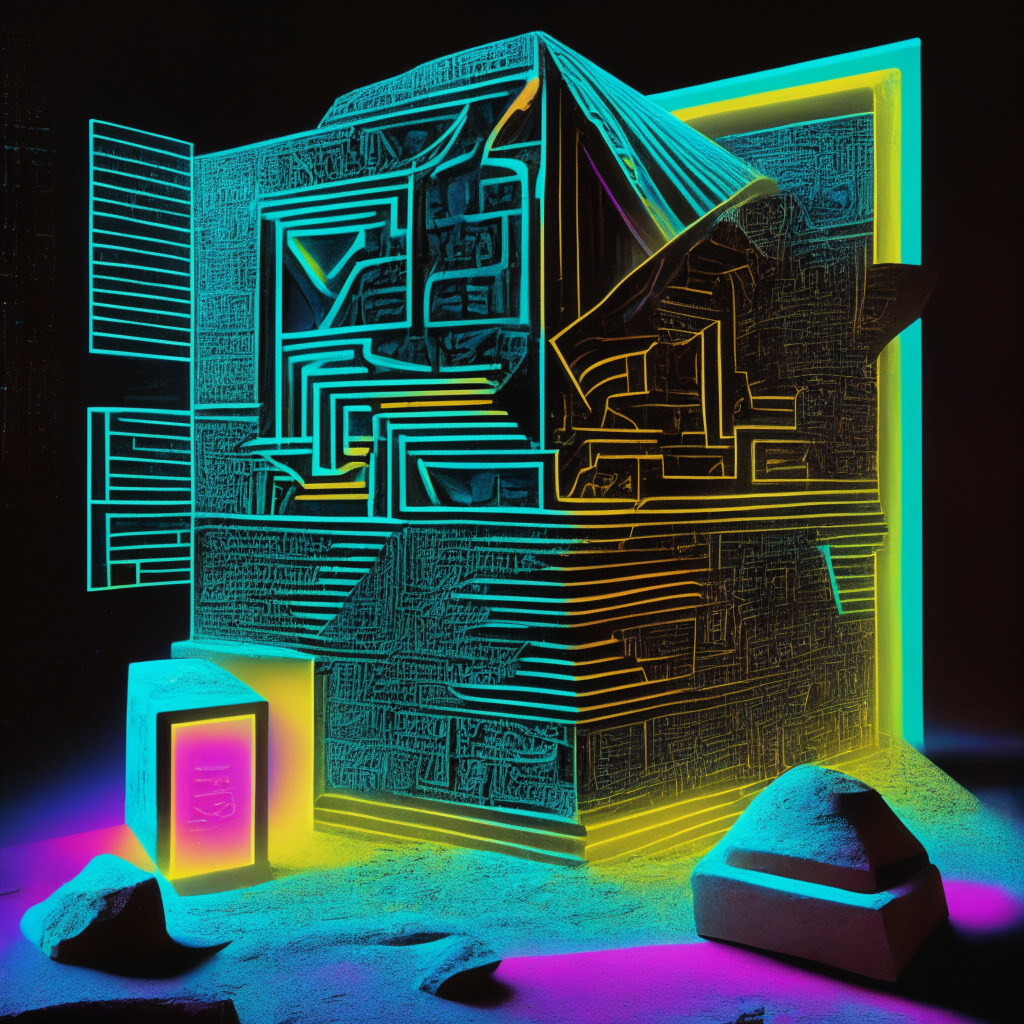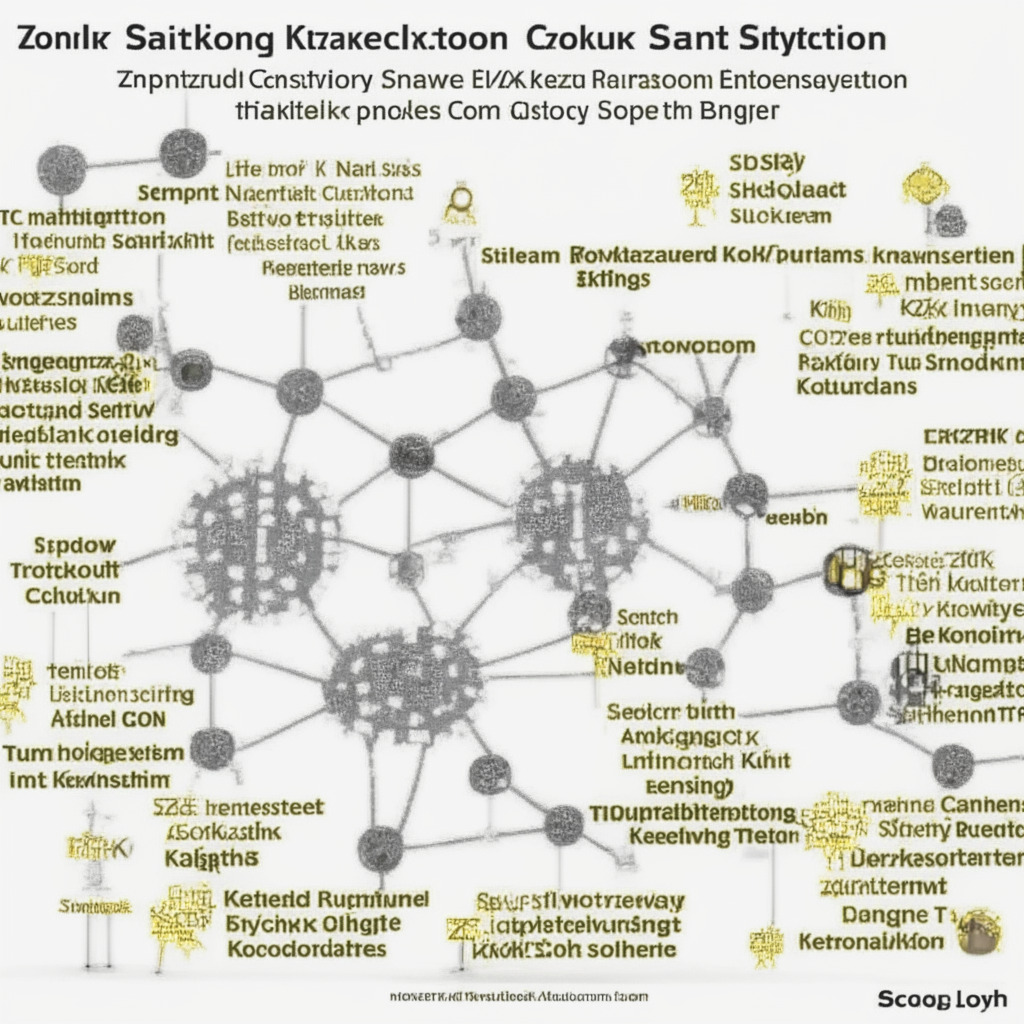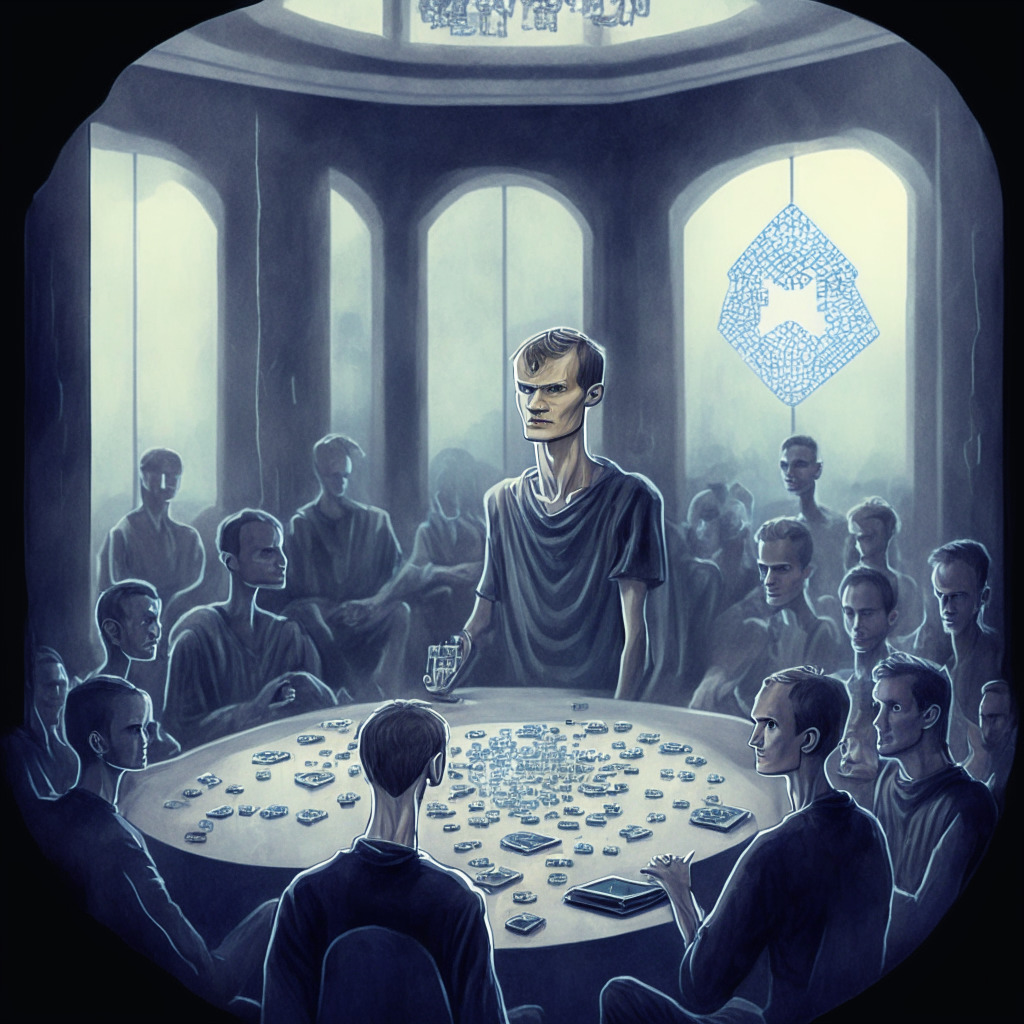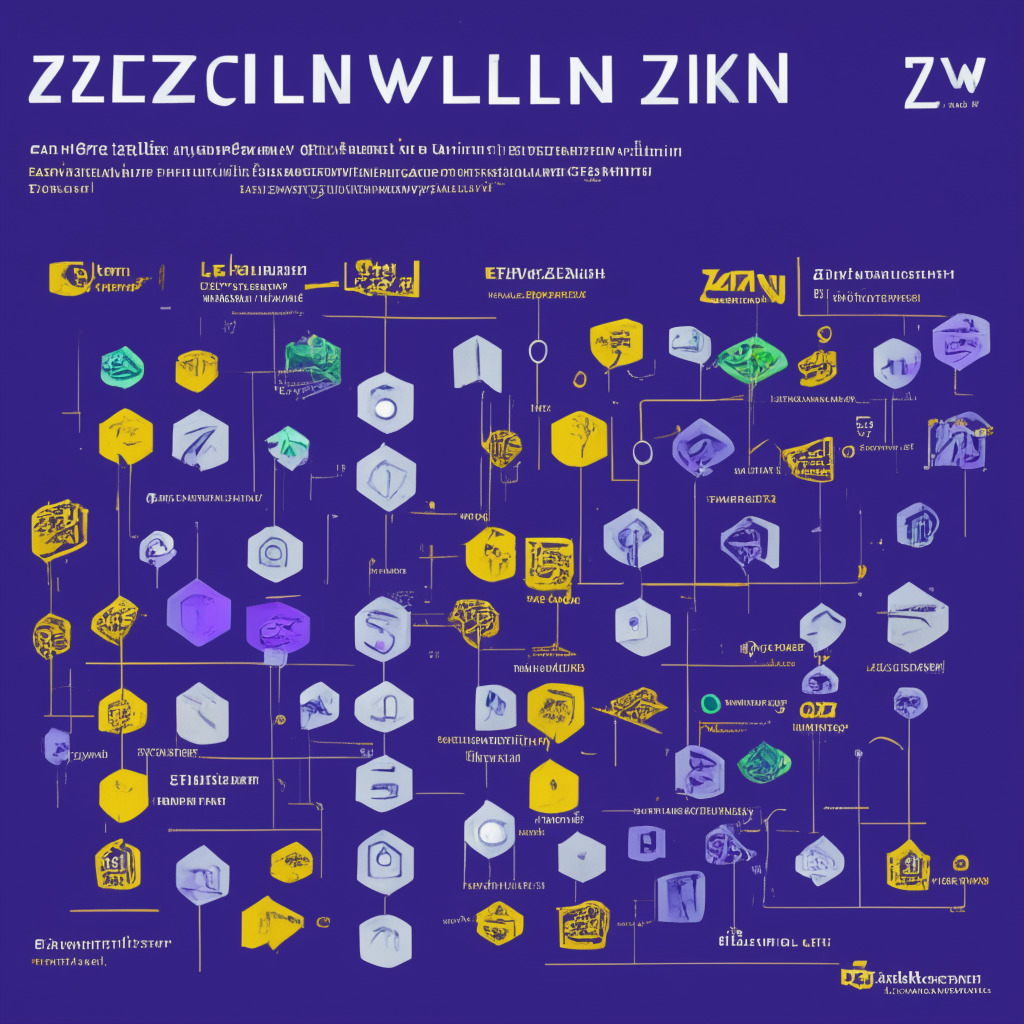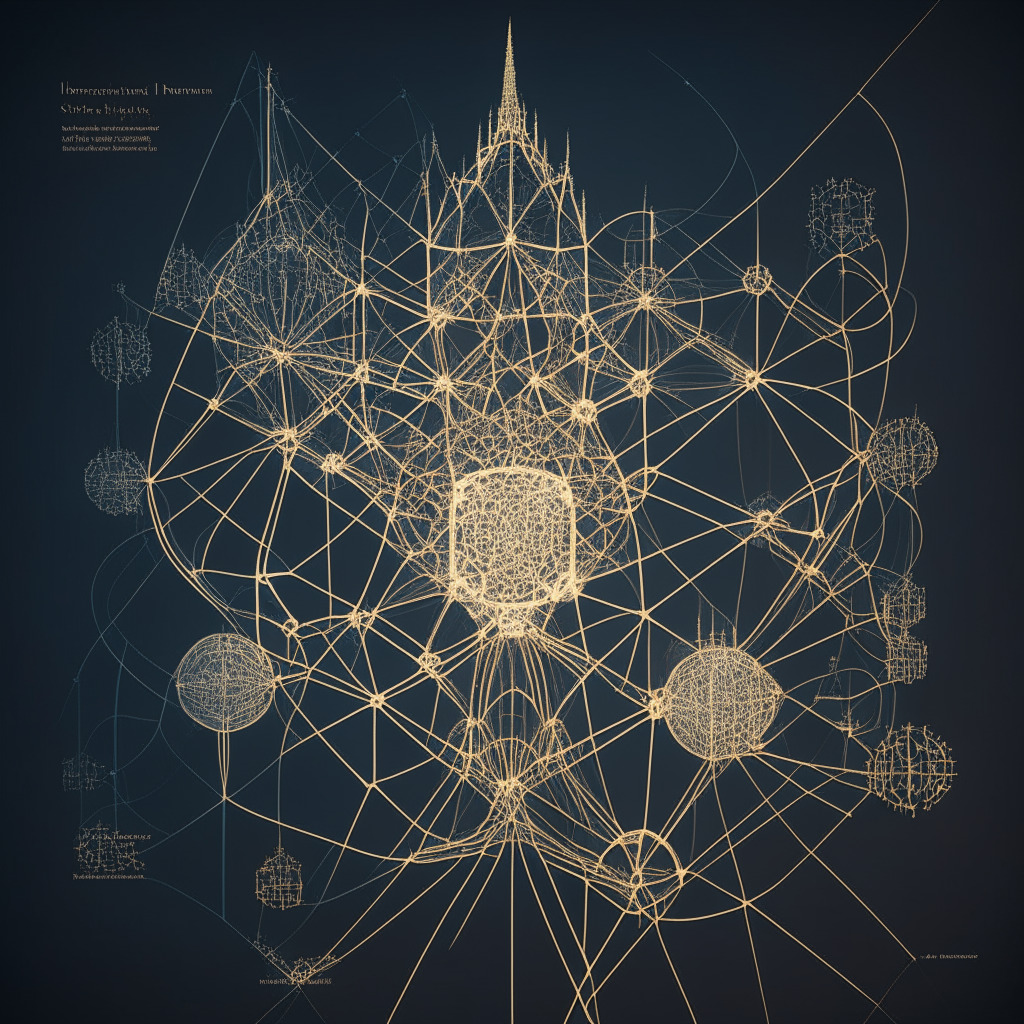A rediscovered video of early Bitcoin pioneer, Hal Finney, discussing zero-knowledge proofs, a cryptographic principle now integral to blockchain technology, provides insight into the early workings of Bitcoin and Satoshi Nakamoto. Finney’s contribution to privacy-enhancing technologies, including the anonymous email system and Proof of Work system, underpin today’s blockchain infrastructure.
Search Results for: Zero-Knowledge Proofs
Balancing Financial Regulation and On-Chain Privacy with Zero-Knowledge Proofs
Ethereum co-founder, Vitalik Buterin, proposes the use of zero-knowledge proofs (ZK-proofs) for ensuring financial compliance and privacy in the blockchain world. This method can verify claim affirmations without divulging all transaction details, thus balancing anonymity and accountability. However, acceptance and successful execution within the blockchain community and regulatory bodies will determine the viability of this potential revolution in blockchain technology.
Unraveling the Mystery of Zero-Knowledge Proofs: A Double-Edged Sword in Crypto Privacy
“Zero-knowledge proofs (ZK-proofs), cryptographic protocols that authenticate transactions without disclosing specifics or user identities, play a significant role in improving the privacy and scalability of cryptocurrency transactions. However, aspects like verifying protocol, potential security flaws and facilitating illegal activity present challenges to their wide adoption.”
Unlocking Blockchain’s Potential: Zero-Knowledge Proofs, Privacy, and Regulatory Challenges
Blockchain needs its SSL equivalent to become genuinely useful. Zero-knowledge cryptography may unlock blockchain’s full potential in a secure and compliant manner while preserving user privacy. However, achieving the right balance between privacy and transparency is crucial for mainstream adoption.
Zero-Knowledge Tech Fueled W-Pay: A Revolution in Secure Crypto Transactions
“Wirex, a global digital payment platform, introduces W-Pay, an App Chain powered by Zero-Knowledge technology. Aimed at enhancing connections between DApps, non-custodial wallets, and traditional payment systems, it offers swift, secure transactions and total fund control. The Ethereum Virtual Machine compatibility ensures diverse functionalities and promotes crypto ecosystem interoperability.”
Breaking Boundaries with Zero Knowledge Proofs: Andreessen Horowitz’s Lasso and Jolt Projects Unveiled
Andreessen Horowitz recently unveiled two innovative open-source projects, Lasso and Jolt, centered around zero-knowledge proofs – a robust form of cryptography. These initiatives aim to enhance transaction speed, cut costs, boost privacy, and empower external developers, introducing new opportunities to scale blockchain networks.
Decoding the Andrew Horowitz Bet on ZK Proofs: Unlocking Blockchain’s Future or Unlocking Concerns?
Venture capital firm Andreessen Horowitz (a16z) is investing in the development of zero-knowledge (ZK) proofs and open-source software projects, Lasso and Jolt, aiming for scaling blockchains while preserving transaction privacy. These technological advancements may transform blockchain’s scalability and privacy, but could also introduce new vulnerabilities and challenges.
Unveiling a Tamper-Proof Future: The Revolution of Data Security in Blockchain with Zero-Knowledge Proof
“Space and Time, a decentralized Web3 data service, has launched a tool powered by Zero-knowledge proof technology for SQL queries. The company’s Proof of SQL ensures data integrity in its decentralized network, enhancing data security for retail, finance, gaming, and blockchain-based solutions.”
DeFi’s $39M Loss Fuels Rise of ZK-Proofs: A Game-Changer or Mask for Dark Exploits?
“The DeFi sector has been shaken by substantial losses due to cyberattacks, stirring interest in zero-knowledge-proof (ZK-proof) technology. This tech allows for encrypted, private transactions without revealing sensitive details, improving transaction speed and security. However, it may hinder industry transparency and has implementation challenges.”
Merging AI and Zero Knowledge Proofs: Skyrocketing Blockchain’s Future or a Risky Endeavor?
“Blockchain technology combines with zero-knowledge proofs (ZK-proofs) and AI for improved smart contract solutions. Despite challenges, experts remain optimistic about its future. Integration of ZK-proof with AI hints at a transformative occurrence that continues shaping blockchain’s promising future.”
Exploring ZK Proofs: Privacy Panacea or Another Layer of Web Complexity?
“ZK proofs, or zero-knowledge proofs, are cryptographic measures that could solve internet users’ privacy concerns. They secure data from the onset, only revealing essential aspects, potentially reshaping the internet framework. However, they may also add to the complexity of online security measures.”
Rapid Scaling of Ethereum: Harnessing the Power of ZK-Proofs and the Challenge of Off-chain Computations
“The Ethereum ecosystem is encouraging competition, with many firms developing Zero-Knowledge Scaling solutions. This technology enables secure off-chain computations and only light, non-data-revealing proofs on the Ethereum mainnet. Despite its efficiency, questions arise about the sustainability and security of off-chain transaction computations.”
Bolstering Blockchain: The Integration of ZK Proofs in Cryptographic Technologies
This article discusses the partnership between Paris-based =nil; Foundation and Fabric Cryptography as they work together to enhance cryptographic technologies and accelerate the deployment of zero-knowledge (ZK) proofs – a cryptographic procedure with substantial privacy-preserving attributes. They aim to overcome barriers in computation, making ZK proofs more functional for digital transactions, cloud services and privacy applications.
Teleporting Assets: Storage Proofs Revolutionize Cross-Chain Transfers and Security
Storage proofs, a cryptographic method aiming to revolutionize cross-chain asset transfers, may provide a more secure alternative to vulnerable bridges in the growing blockchain ecosystem. Starknet plans to be the first network to natively integrate storage proofs, potentially eliminating intermediary third-party “oracles,” offering enhanced security and user experience for asset transfers.
Scaling Bitcoin With zk-Proofs: A Solution to Network Congestion and Transaction Fees?
The Bitcoin network faces congestion and increased transaction fees due to the demand for BRC-20 tokens. Zero-knowledge proofs (zk-proofs) may help address these issues by enhancing privacy, security, and blockchain capacity. Projects such as ZeroSync are exploring solutions like zkCoins to increase transaction throughput and improve network scalability.
Pros and Cons of Vitalik Buterin’s “Privacy Pools”: Balancing Blockchain Transparency and Anonymity
“Vitalik Buterin co-authored a paper exploring a potential solution to the inherent privacy leak in blockchain, balancing privacy and compliance. The proposed synthesis of zero-knowledge proofs with “Privacy Pools” attempts to obscure crypto users’ blockchain history without associating with illicit activities. Critics, however, question this method’s legal and practical efficacy.”
Balancing Act: Ethereum’s Quest for Privacy, Regulation, and Decentralization with Privacy Pools
Ethereum’s co-founder, Vitalik Buterin, leads a privacy protocol initiative, ‘Privacy Pools,’ employing zero-knowledge proofs to verify user funds legitimacy, preserving transactional privacy. The protocol aims to create a separation that filters out funds related to criminal activities, harmoniously balancing financial privacy and regulation.
Shifting the Gaming Landscape: Immutable zkEVM and the Unpredictable World of Crypto
Immutable’s zkEVM, a Ethereum-compatible gaming platform developed with Polygon Labs, has begun public testing. This platform uses zero-knowledge proofs to secure transfers, decreasing development costs and enhancing security. However, Ethereum founder Vitalik Buterin warns it may cause data inefficiency and latency issues.
Venture Capital Boom in the Crypto Industry Amidst its Chilled Winter
“Last week observed a striking $201.4 million venture capital infusion into digital currency firms, exemplifying the resilience of crypto industry despite challenges. Investments focused on innovative technologies such as zero-knowledge proofs. However, the volatility marked by tokens like RDNT reminds of the persistent risks.”
RISC Zero Bags $40 Million for its Bonsai Computing Platform: A Step to Decentralized Security
RISC Zero, known for zero-proof software solutions, raised $40 million in a Series A funding led by Blockchain Capital to boost its innovative Bonsai computing platform. The platform aids developers with incorporating zero-knowledge proofs to enhance application security and complex computations.
Scaling Ethereum’s Future: The Rise of Linea & the Road to Unlocked Potentials
“ConsenSys’ new layer-2 scaling solution, Linea, encourages developers to create or migrate decentralized applications for Ethereum. Powered by zero-knowledge proofs, Linea promises seamless Ethereum blockchain interaction, improved performance, better user experience, and lower transaction costs. Intertwined with MetaMask, it seeks to boost non-fungible tokens, blockchain games, and social media applications. Despite some initial access restrictions, Linea’s future looks promising.”
Navigating the Future of Blockchain: Polygon’s Leadership Changes and Technological Shifts
Polygon Labs, known for its innovative blockchain efforts, has initiated strategic leadership changes, aligning with their transition towards “Polygon 2.0”. Devoting efforts to unifying Polygon chains via a “coordination layer”, they also plan to upgrade their legacy “PoS” chain for a compatibility with zero-knowledge proofs, advancing their commitment to confidentiality of transactions while bearing potential complexities and security risks.
Navigating the Thin Line: Nuggets, BoE and the Privacy Debate in the Digital Pound Era
UK-based payments platform, Nuggets, collaborates with the Bank of England to create a privacy and identity layer for a potential digital pound. Nuggets aims for a system free from transactional tracking, with zero-knowledge proofs to validate identities without data exposure, balancing user privacy and regulatory oversight.
Polygon 2.0: zkEVM Validium Upgrade for Improved PoS Chain – Pros, Cons, and Conflict
Polygon Labs proposes upgrading its proof-of-stake (PoS) chain to a zkEVM validium to improve security and performance. The upgrade addresses issues like fast block times affecting gas estimation and chain reorgs while integrating zero-knowledge proofs into the infrastructure. Implementation is expected by Q1 2024 if accepted.
Polygon PoS Upgrade to zkEVM Validium: Security vs Scalability vs Decentralization Debate
Polygon co-founder Mihailo Bjelic proposes an upgrade to the Polygon PoS network, suggesting a shift to a “zkEVM validium” version for increased security through zero-knowledge proofs. This upgrade would enable Polygon zkEVM for high-value transactions, offering lower fees and enhanced security from Ethereum’s features, targeting applications like Web3 gaming and social media.
Exploring Polygon PoS Upgrade to zkEVM Validium: Scalability, Security, and Future Prospects
The Polygon Labs engineering team proposed an upgrade to Polygon Proof-of-Stake (PoS) sidechain, transitioning to ‘zkEVM Validium,’ an Ethereum-secured Layer 2 network secured by zero-knowledge proofs. Targeted for Q1 2024, this upgrade aligns with Polygon 2.0’s vision and aims to enhance scalability, security, and interoperability within the broader cryptocurrency ecosystem.
Worldcoin’s Decentralized Identity: Security Breakthrough or Privacy Nightmare?
Worldcoin, co-founded by OpenAI CEO Sam Altman, raises $115 million for its decentralized World ID and World App, a crypto wallet. The project uses zero-knowledge proofs for digital identity security, but faces concerns about surveillance, personal data misuse, and censorship.
Achieving Finality in Blockchain: Irrevocable Transactions, Challenges and Future Prospects
“Finality in blockchain refers to the irrevocable confirmation of a transaction or block of transactions. Achieving finality has challenges like network latency and potential 51% attacks. However, improved security algorithms, consensus algorithms and advanced cryptographic techniques promise faster, more reliable confirmations, and permanence of transactions.”
Exploring the Dynamics of Blockchain: Kanani’s Transition and FTX’s Downfall
Jaynti Kanani, a key figure in the Polygon project, has decided to take a step back from his operational duties, contributing from a more relaxed standpoint instead. Meanwhile, the crypto world witnessed the collapse of FTX cryptocurrency exchange, underscoring the volatile nature of digital currencies and emphasizing the importance of transparency and checks and balances.
Unraveling the Paradox of Increased Decentralization: The Optimism Network’s Stride and Binance’s Unexpected Move
The Optimism network has launched its testnet version of a fault-proof system aimed at increasing the efficiency and decentralization of the Superchain. Typically reliant on centralized sequencers, the new system offers modular options to prevent fraud. However, co-founder of Ethereum, Vitalik Buterin, asserts the importance of user-submitted fraud proofs to maintain true decentralization.
Decoding Vitalik Buterin’s Privacy Pool Concept: Navigating Blockchain Privacy & Regulatory Compliance
Ethereum co-founder Vitalik Buterin’s proposed privacy pool concept focuses on combining blockchain privacy and regulatory compliance, sparking meaningful discussion in the crypto world. However, concerns over unclear compliance framework, implementation struggles, and acceptance issues remain to be addressed.
The Dance of Crypto Regulation: Analysis of Hong Kong Stability and German Innovation
“In the blockchain and cryptocurrency domain, global jurisdictions are striving to balance innovation fostering and investor protection. With Hong Kong and Germany as examples, this article emphasizes the importance of stability, transparency in regulation, and innovative dynamism for robust crypto markets.”


